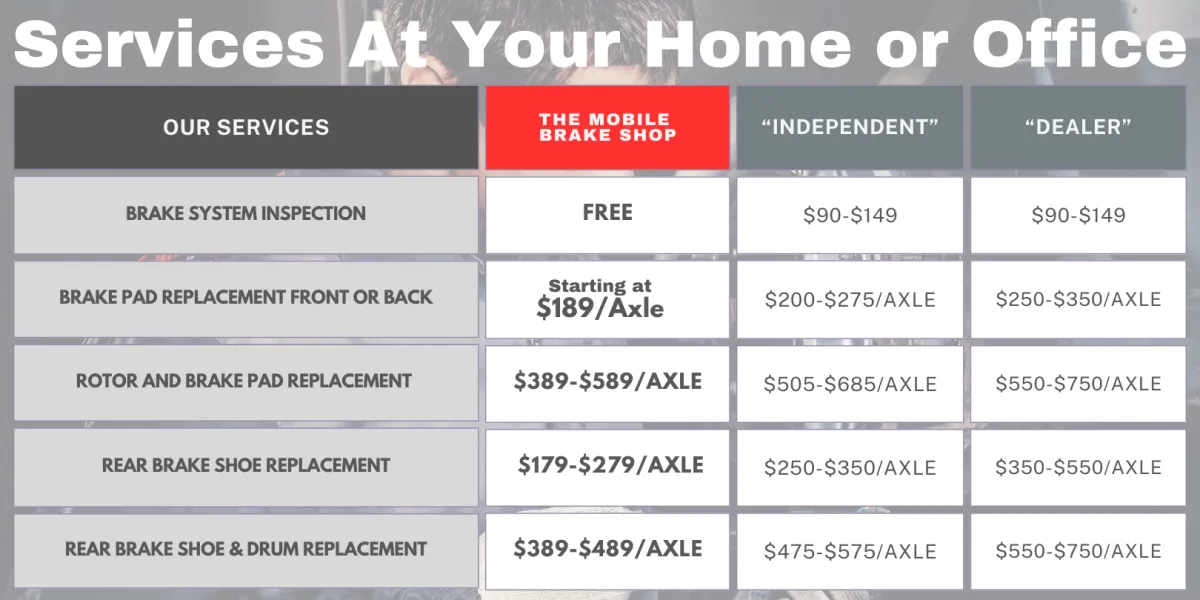How Much Does Brake Repairs Cost?

A Comprehensive Guide by The Mobile Brake Shop
Understanding the Cost of a Brake Repair and Replacement
Regular maintenance and occasional replacement of car parts are crucial for vehicle longevity and safety, and this is especially true for brakes. Ignoring brake wear can lead to more significant damage, higher costs, and potential safety hazards. Here’s an in-depth look at brake repairs to help you stay informed and proactive about your vehicle's brake health.
Key Sections:
- Brake System Components & Parts
- Factors That Affect Brake Job Frequency
- 8 Signs Your Brakes Need Attention
- Brake Repair vs. Brake Replacement
- Cost to Repair or Replace Brakes
- The Brake Replacement Process
- Saving Money on Brake Repairs & Replacement
- Service Your Brakes with The Mobile Brake Shop
Brake System Components & Parts
All vehicles generally share the same basic brake system components:- Master Cylinder: Pushes hydraulic fluid from the brake fluid reservoir into the brake lines.- Drum Brake: Brake shoes press against the inside of a drum on the wheel.- Disc Brake: Uses friction of pads against a disc connected to the wheel.- Brake Rotor: Disc inside the brake pads that puts friction on the wheel to stop it from turning.- Brake Shoe: An alternative to brake pads in a drum brake system.- Brake Drum: Houses the brake shoe that presses outward to cause friction.- Brake Pad: Enables your vehicle to slow down or stop by squeezing onto the rotor disc.- Brake Caliper: Provides the force that pushes the brake pad into the rotor.- Brake Pedal: A pedal that the driver presses to slow down the vehicle.- Anti-Lock Brake System (ABS): Prevents the wheels from locking during heavy braking.- Brake Lines: Deliver hydraulic brake fluid to power the calipers.
Factors Affecting Brake Job Frequency
1. Environment: - Exposure to road salt, dirt, grease, and moisture can accelerate brake wear.2. Driving Habits: - Frequent or heavy braking, hauling heavy loads, and skipping regular maintenance can increase wear.3. Brake Pad Material: - Organic, semi-metallic, low-metallic, and ceramic brake pads have different wear thresholds.
8 Signs Your Brakes Need Attention
- Strange noises or high-pitched squeaking when braking.- Increased stopping distance.- Steering wheel shakes when stopping.- Unusual shimmying or shuddering when braking.- Uneven pulling to one side.- Squealing or scraping noise when reversing.- Need to pump the pedal for better stopping power.- Brake indicator lights turning on.
Brake Repair vs. Brake Replacement
While minor repairs can save money short-term, full replacements are recommended for long-term reliability and safety. Replacing both rotors and pads ensures even wear and better performance.
Cost of Brake Repair & Replacement
Costs vary based on vehicle make, model, part quality, and labor. Here are typical ranges:- Brake Parts: $35–$150 per part- Brake Repair Labor: $80–$160 per hour- Total Brake Pad Replacement: $150–$300 per axle- Total Brake Pad and Rotor Replacement: $400–$600 per axle
Brake Replacement Process
1. Inspection: Technicians will inspect your vehicle to diagnose issues.2. Removal: Worn brake pads and/or rotors are removed and disposed of.3. Installation: New rotors and brake pads are installed, and the brake pedal is pumped until firm.4. Assessment: The completed brake housing is assessed to ensure proper fixing.
Saving Money on Brake Repairs
- Research: Compare prices for parts and labor.- Customer Reviews: Check reviews to gauge the reliability of repair shops.- Use Your Network: Ask friends and family for recommendations.- Preventive Maintenance: Regular maintenance can prolong brake life.
Service Your Brakes with The Mobile Brake Shop
The Mobile Brake Shop offers top-quality brake repairs and replacements performed by ASE-Certified technicians. We provide free brake inspections and stock high-quality parts at competitive prices. Contact us today to schedule your next brake service.
FAQs About Brake Job & Replacement Costs
How long does a brake job take?- Typically, brake repair takes between 45 - 90 minutes, depending on the state of the parts and technician availability. Does brake replacement cost more than repair?- While repairs may save money short-term, replacements are more cost-effective long-term and offer warranty protection. Do I need to replace all brakes at once?- It’s recommended to replace both brakes on the same axle simultaneously for even wear and better performance. How often should brake pads be replaced?- Brake pads should generally be replaced every 10,000 to 20,000 miles. Rotors may need replacement every 50,000 to 70,000 miles.
For expert brake services, trust the professionals at The Mobile Brake Shop. Schedule your appointment today!
FAQS
What are the signs that my brakes need attention?
If you notice any of the following signs, it's time to have your brakes inspected:
Squeaking or grinding noises when you apply the brakes
Increased stopping distance or reduced brake responsiveness
A soft or spongy brake pedal
Vibrations or pulsations when braking
Warning lights on your dashboard, such as the ABS or brake warning light.
How much does it cost to have my brakes inspected?
We offer a NO-CHARGE BRAKE INSPECTIONS!
We will inspect your entire brake system before any repairs are made. In fact, in some cases brake repairs may not be necessary.
Do you offer any warranties on your services?
Yes, we stand behind our work with a comprehensive warranty. Our warranty covers both parts and labor for the repairs and upgrades we provide. The specifics may vary depending on the service, so please ask our team for details when you visit our shop. Your peace of mind is important to us, and we want you to drive away with confidence in the quality of our work.